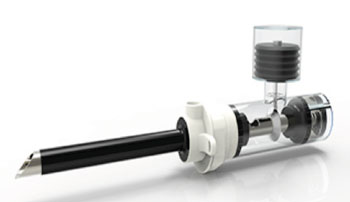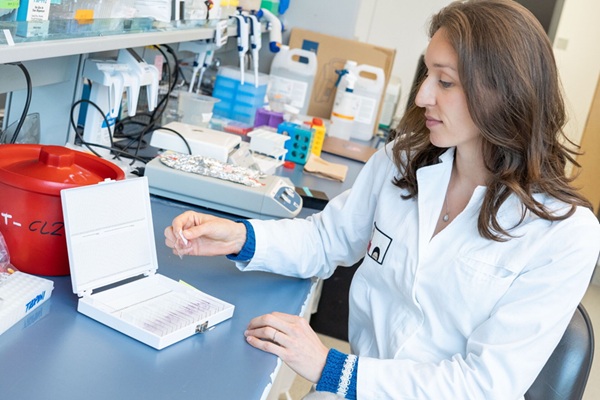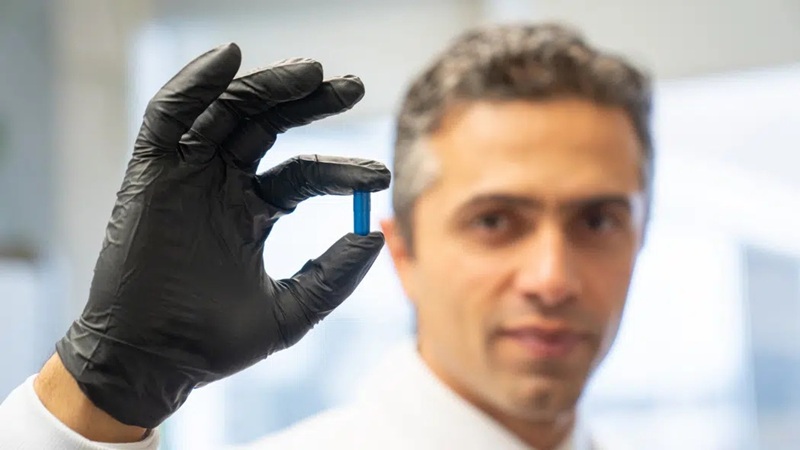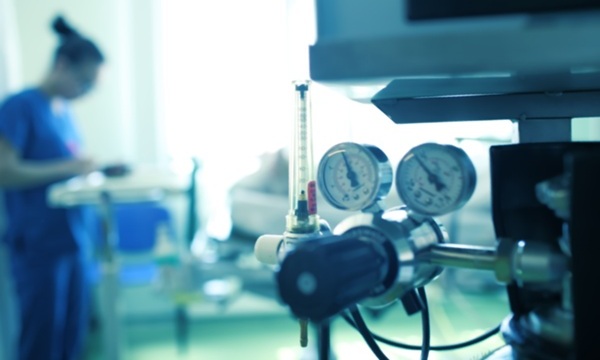Modified Trocar Helps Avert Laparoscopic Surgery Injuries 
|
By HospiMedica International staff writers Posted on 05 Jan 2015 |

Image: Prototype of the new trocar for laparoscopic procedures (Photo courtesy of Nottingham Trent University).
A new trocar for laparoscopic procedures uses an automatic needle safety mechanism which causes it to withdraw the moment it enters the abdominal cavity.
Developed by researchers at Nottingham Trent University (NTU; United Kingdom) and Olberon Medical Innovations (Loos, France), the modified trocar is based on a mechanism which monitors changes in the pressure of the insertion, and inflates a diaphragm which activates its own withdrawal by the force of a tiny spring, after it passes through the muscle and tissue.
“It’s imperative that the trocar is improved to help avoid the kinds of accidents which can cause serious and fatal injuries, no matter how rare,” said Prof. Amin Al-Habaibeh, PhD, of the NTU school of architecture, design, and the built environment, who developed the trocar together with research assistant Joaquim Justino Netto, a student from Brazil on placement as part of the Science Without Borders scholarship. “This simple invention could be an important tool which prevents accidents and enables surgeons to carry out this routine procedure with increased confidence at a lower risk of injury to the patient.”
“This advanced trocar is a significant improvement on existing products and highlights the importance of industry working with academia,” said Arash Bakhtyari, MD, managing director of Olberon Medical Innovations. “Through the longstanding and successful collaboration with Nottingham Trent University, we have developed a novel medical invention which has the potential to help doctors and patients around the world.”
Although complications are rare, bowel perforations or bile duct injuries which remain undiagnosed until after surgery can result in life threatening complications such as circulatory collapse or septic shock. Data from the UK National Patient Safety Agency (London, United Kingdom) shows that between 2003 and 2010, there were 48 serious incidents relating to laparoscopic surgery, including 11 deaths.
Related Links:
Nottingham Trent University
Olberon Medical Innovations
National Patient Safety Agency
Developed by researchers at Nottingham Trent University (NTU; United Kingdom) and Olberon Medical Innovations (Loos, France), the modified trocar is based on a mechanism which monitors changes in the pressure of the insertion, and inflates a diaphragm which activates its own withdrawal by the force of a tiny spring, after it passes through the muscle and tissue.
“It’s imperative that the trocar is improved to help avoid the kinds of accidents which can cause serious and fatal injuries, no matter how rare,” said Prof. Amin Al-Habaibeh, PhD, of the NTU school of architecture, design, and the built environment, who developed the trocar together with research assistant Joaquim Justino Netto, a student from Brazil on placement as part of the Science Without Borders scholarship. “This simple invention could be an important tool which prevents accidents and enables surgeons to carry out this routine procedure with increased confidence at a lower risk of injury to the patient.”
“This advanced trocar is a significant improvement on existing products and highlights the importance of industry working with academia,” said Arash Bakhtyari, MD, managing director of Olberon Medical Innovations. “Through the longstanding and successful collaboration with Nottingham Trent University, we have developed a novel medical invention which has the potential to help doctors and patients around the world.”
Although complications are rare, bowel perforations or bile duct injuries which remain undiagnosed until after surgery can result in life threatening complications such as circulatory collapse or septic shock. Data from the UK National Patient Safety Agency (London, United Kingdom) shows that between 2003 and 2010, there were 48 serious incidents relating to laparoscopic surgery, including 11 deaths.
Related Links:
Nottingham Trent University
Olberon Medical Innovations
National Patient Safety Agency
Latest Surgical Techniques News
- New Classification System Brings Clarity to Brain Tumor Surgery Decisions
- Boengineered Tissue Offers New Hope for Secondary Lymphedema Treatment
- Dual-Energy Catheter Brings New Flexibility to AFib Ablation
- 3D Bioprinting Pushes Boundaries in Quest for Custom Livers
- New AI Approach to Improve Surgical Imaging
- First-Of-Its-Kind Probe Monitors Fetal Health in Utero During Surgery
- Ultrasound Device Offers Non-Invasive Treatment for Kidney Stones
- Light-Activated Tissue Adhesive Patch Achieves Rapid and Watertight Neurosurgical Sealing
- Minimally Invasive Coronary Artery Bypass Method Offers Safer Alternative to Open-Heart Surgery
- Injectable Breast ‘Implant’ Offers Alternative to Traditional Surgeries
- AI Detects Stomach Cancer Risk from Upper Endoscopic Images
- NIR Light Enables Powering and Communicating with Implantable Medical Devices
- Simple Bypass Protocol Improves Outcomes in Chronic Cerebral Occlusion
- Implantable Absorbable Sensor Detects Life-Threatening Complications After Intestinal Surgery
- New Study Findings Enable Improved Ventilation During Complex Lung Surgery
- 3D-Printed Blood Vessel Scaffolds Could Transform Heart Bypass Surgeries
Channels
Artificial Intelligence
view channelCritical Care
view channel
Glowing Bacterial Sensors Could Improve Detection of Gut Illness
Diagnosing gastrointestinal diseases often relies on invasive procedures such as endoscopy, which provide only a single snapshot of gut health. These methods make it difficult to track how diseases progress... Read moreGut Bacteria from Amphibians and Reptiles Show Complete Tumor Elimination
While the relationship between gut microbiota and cancer has drawn growing attention in recent years, most strategies have focused on indirect approaches such as microbiome modulation or fecal microbiota... Read morePatient Care
view channel
Revolutionary Automatic IV-Line Flushing Device to Enhance Infusion Care
More than 80% of in-hospital patients receive intravenous (IV) therapy. Every dose of IV medicine delivered in a small volume (<250 mL) infusion bag should be followed by subsequent flushing to ensure... Read more
VR Training Tool Combats Contamination of Portable Medical Equipment
Healthcare-associated infections (HAIs) impact one in every 31 patients, cause nearly 100,000 deaths each year, and cost USD 28.4 billion in direct medical expenses. Notably, up to 75% of these infections... Read more
Portable Biosensor Platform to Reduce Hospital-Acquired Infections
Approximately 4 million patients in the European Union acquire healthcare-associated infections (HAIs) or nosocomial infections each year, with around 37,000 deaths directly resulting from these infections,... Read moreFirst-Of-Its-Kind Portable Germicidal Light Technology Disinfects High-Touch Clinical Surfaces in Seconds
Reducing healthcare-acquired infections (HAIs) remains a pressing issue within global healthcare systems. In the United States alone, 1.7 million patients contract HAIs annually, leading to approximately... Read moreHealth IT
view channel
EMR-Based Tool Predicts Graft Failure After Kidney Transplant
Kidney transplantation offers patients with end-stage kidney disease longer survival and better quality of life than dialysis, yet graft failure remains a major challenge. Although a successful transplant... Read more
Printable Molecule-Selective Nanoparticles Enable Mass Production of Wearable Biosensors
The future of medicine is likely to focus on the personalization of healthcare—understanding exactly what an individual requires and delivering the appropriate combination of nutrients, metabolites, and... Read moreBusiness
view channel
Medtronic and Mindray Expand Strategic Partnership to Ambulatory Surgery Centers in the U.S.
Mindray North America and Medtronic have expanded their strategic partnership to bring integrated patient monitoring solutions to ambulatory surgery centers across the United States. The collaboration... Read more
FDA Clearance Expands Robotic Options for Minimally Invasive Heart Surgery
Cardiovascular disease remains the world’s leading cause of death, with nearly 18 million fatalities each year, and more than two million patients undergo open-heart surgery annually, most involving sternotomy.... Read more
WHX in Dubai (formerly Arab Health) to debut specialised Biotech & Life Sciences Zone as sector growth accelerates globally
World Health Expo (WHX) in Dubai, formerly Arab Health, which takes place from 9-12 February 2026 at the Dubai Exhibition Centre (DEC), has officially announced the launch of a new dedicated Biotech &... Read more
















